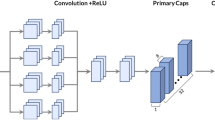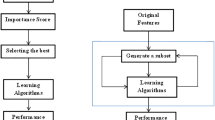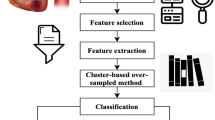Abstract
Cardiovascular Diseases (CVDs) are a group of disorders affecting the heart and blood vessels. They have been considered in recent years as one of the main causes of death in the world. Patients with heart disease do not feel sick until the very last stage of the disease and most heart patients die before receiving any treatment. Machine Learning and Deep Learning techniques play an important role in early prediction of heart disease, to improve the quality of healthcare and help individuals to avoid earlier health complications as coronary artery infection and decreased function of blood vessels .
Nowadays, the field of health care produces a large amount of data. The need for efficient techniques for processing this data has become necessary. In this paper, a model for cardiovascular disease prediction based on Dense Deep Neural Networks (Dense-DNN) is developed and attributes selection is performed via a Genetic Algorithm (GA). The GA is used to identify the best subset of attributes from the entire features in the dataset, to improve the performances and reduce the training time of the classification model. Our prediction model is compared to several traditional Machine Learning techniques. The performances of our system have been evaluated based on six parameters: (1) accuracy, (2) sensitivity, (3) specificity, (4) F-measure, (5) RMSE, and (6) MAE. Experimental results show that our proposed model outperforms state-of-the-art methods in terms of performance evaluation metrics. The achieved accuracy of the proposed model is 91.7% without using feature selection and 95% with the use of feature selection.
Access this chapter
Tax calculation will be finalised at checkout
Purchases are for personal use only
Similar content being viewed by others
References
WHO: World Health Organization, Media Centre, cardiovascular diseases fact sheet webpage. https://www.who.int/news-room/fact-sheets/detail/cardiovascular-diseases-(cvds). Accessed 11 June 2021
APS: Algeria Press Services webpage. https://www.aps.dz/en/health-science-technology. Accessed 24 Mar 2021
Dash, M., Liu, H.: Feature selection for classification. Intell. Data Anal. 1(1–4), 131–156 (1997)
Jain, A., Zongker, D.: Feature selection: evaluation, application, and small sample performance. IEEE Trans. Pattern Anal. Mach. Intell. 19(2), 153–157 (1997)
Yang, J., Honovar, V.: Feature subset selection using a genetic algorithm. IEEE Intell. Syst. 13, 44–49 (1998)
Gupta, A., et al.: HeartCare: IoT based heart disease prediction system International Conference on Information Technology (ICIT) (2019)
Mohan, S., et al.: Effective heart disease prediction using hybrid machine learning Techniques. IEEE Access (2019). http://https://doi.org/10.1109/ACCESS.2019.2923707
Sajja, T.K., et al.: A deep learning model for prediction of cardiovascular disease using convolutional neural network. Revue d’Intelligence Artificielle 34(5), 601–606 (2020) http://iieta.org/journals/ria
Dahiwade, D., et al.: Designing disease prediction model using machine learning approach. In: Proceedings of the Third International Conference on Computing Methodologies and Communication (ICCMC 2019) IEEE Xplore Part Number: CFP19K25-ART; ISBN: 978–1–5386–7808–4
El Hamadaoui, H., et al.: A clinical support system for prediction of heart disease using machine learning techniques. In: 5th International Conference on Advanced Technologies for Signal and Image Processing, ATSIP’ 2020, Sfax, Tunisia
Heart Disease Dataset. https://archive.ics.uci.edu/ml/datasets/heart+disease
Oluleye, B., et al.: A genetic algorithm-based feature selection. Int. J. Electron. Commun. Comput. Eng. (2014)
Nair, V., Hinton, G.E.: Rectified linear units improve restricted Boltzmann machines. In: Proceedings of the 27 th International Conference on Machine Learning, pp. 807–814 (2010)
loffe, S., Szegedy, C.: Batch normalization: accelerating deep network training by reducing internal covariate shift. In: Internationale Conference on Machine Learning, pp. 448–456 (2015)
Zhuang, J., et al.: Adabelief optimizer: adapting stepsizes by the belief in observed gradients. Adv. Neural Inf. Process. Syst. 33, 18795–18806 (2020)
Ramalingam, V.V., et al.: Heart disease prediction using machine learning techniques: a survey. Int. J. Eng. Technol. 7 (2.8), 684–687 (2018)
Katarya, R., Kumar Meena, S.: Machine learning techniques for heart disease prediction: a comparative study and analysis, IUPESM and Springer-Verlag GmbH Germany, part of Springer Nature 2020
Sateesh Kumar, R., Sameen Fatima, S.: Heart disease prediction using extended KNN (E-KNN). In: Satapathy, S.C., Bhateja, V., Favorskaya, M.N., Adilakshmi, T. (eds.) Smart Computing Techniques and Applications. SIST, vol. 224, pp. 565–572. Springer, Singapore (2021). https://doi.org/10.1007/978-981-16-1502-3_56
Donga, W., et al.: XGBoost algorithm-based prediction of concrete electrical resistivity for structural health monitoring, Automation in Construction, Elsevier (2021)
Baccouche, et al.: Ensemble deep learning models for heart disease classification: a case study from Mexico. Information 11, 207 (2020). https://doi.org/10.3390/info11040207
Author information
Authors and Affiliations
Corresponding author
Editor information
Editors and Affiliations
Rights and permissions
Copyright information
© 2023 The Author(s), under exclusive license to Springer Nature Switzerland AG
About this paper
Cite this paper
Manaa, A., Brahimi, F., Chouiref, Z., Kessouri, M., Amad, M. (2023). Cardiovascular Diseases Prediction Based on Dense-DNN and Feature Selection Techniques. In: Chikhi, S., Diaz-Descalzo, G., Amine, A., Chaoui, A., Saidouni, D.E., Kholladi, M.K. (eds) Modelling and Implementation of Complex Systems. MISC 2022. Lecture Notes in Networks and Systems, vol 593. Springer, Cham. https://doi.org/10.1007/978-3-031-18516-8_24
Download citation
DOI: https://doi.org/10.1007/978-3-031-18516-8_24
Published:
Publisher Name: Springer, Cham
Print ISBN: 978-3-031-18515-1
Online ISBN: 978-3-031-18516-8
eBook Packages: EngineeringEngineering (R0)




